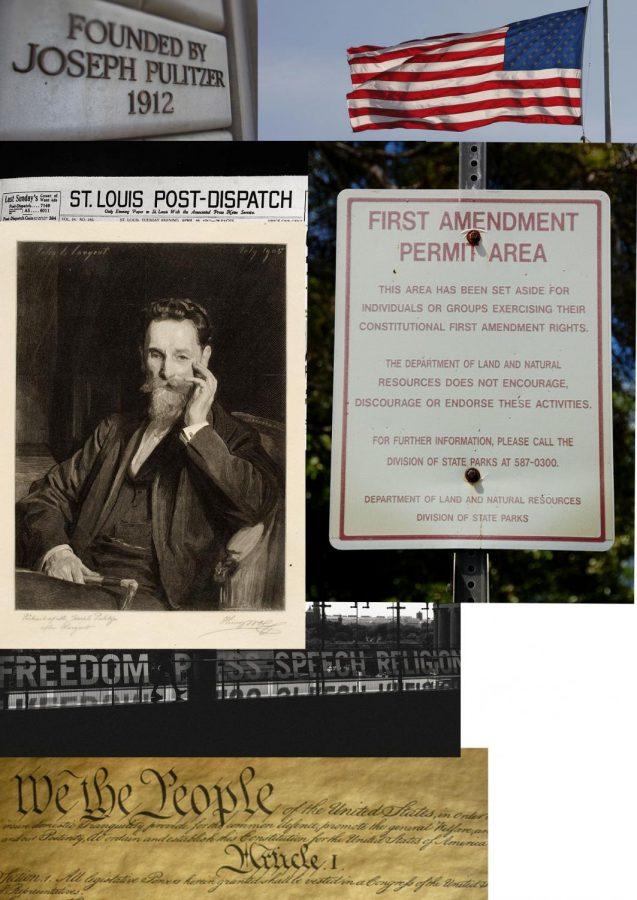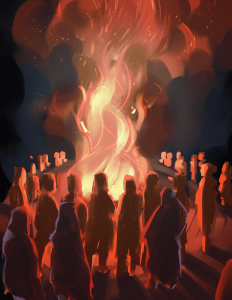Pulitzer and Preserving the American Dream
November 12, 2020
The First Amendment, the power to free speech and a right to information, is a powerful tool that all Americans share.
Joseph Pulitzer, a people’s hero in journalism, not only personifies the American Dream, but he executes the way every American should try to fight for justice.
In an atmosphere of chaos that is current day America, the man stands out like a lighthouse in a storm. As a statement to his impact in American culture, the Pulitzer prize was built, encouraging journalists to strive for the truth.
Pulitzer never had much. He was born in Hungary in 1847 with a handful of different health problems. Bad eyesight, poor hearing, and senses that never seemed to work. However, even with the odds against him, he found a driving sensation. He decided to fight.
Volunteering for multiple military organizations, Pulitzer would be denied except for one. The only military organization that would allow an unhealthy, blind man into their service was the United States Union Army. He boarded a boat traveling to a country that was being torn in half, finding himself in the middle of the most bloody catastrophe in American history, The Civil War.
The war proved to be a wicked force for the young soul. Without knowing a lick of English, he was drafted into a special European division for the Union army. This was his first experience of being discriminated against due to his immigrant status. Since these European soldiers were immigrants, they were stigmatized, stereotyped and rejected by other American soldiers.
After the war, the need to be recognized by the Amerians he fought for grew in his heart. He decided that he was not going to be put at a disadvantage because of the languages he spoke or didn’t speak. Yet again, Pulitzer found himself pursuing another fight, but this time it was a fight to prove the equality of those not born within the boundaries of America.
He studied English vigorously in St. Louis, Missouri. His health disadvantages and citizenship may have undermined his social status, but Pulitzer decided that the norms of American culture, the norms of privilege, would be his mission to fight. During his studies, he made a game of chess between two different men his focus for the afternoon.
After a bad move, Pulitzer critiqued one of the men’s decision and expressed reasons why that move should not have been played. The man he critiqued happened to be an editor at the Westliche Post, the leading German Daily. Apparently, Pulitzer’s willingness to speak out and criticize, a key part of his future, impressed the editor, and a job was soon offered to the young Pulitzer. And so began a career in journalism, a field in which he soared to new heights.
Geri Migielicz is a winner of a Pulitzer prize and has an illustrious career in journalism. Now, she advises aspiring writers at Stanford University. When asked how important journalism is in America she expressed the absolute pertinence of the platform in itself.
“Journalism is critical to a thriving democracy. Citizens need accurate and verified information in order to make decisions about voting and participate in local government.
Journalism also serves an important watchdog role under the First Amendment to shed light on abuses of governmental and corporate power. In a capacity for advocacy and for framing policy, the news media performs an important, if not formally recognized social function in democracy.”
In the field of journalism, Pulitzer found the real fight. With his new career, revelations about the tainted nature of American elites came into his focus. Those who were born with everything, money, big houses, powerful jobs and grandiose social statuses taunted him. Here is a man, born with nothing but the ability to fight for what he thought was right, being met with some of the most privileged people in the country.
When Geri Migielicz was asked if journalism is one of the best ways to express the First Amendment, she said in an email, “An informed citizenry is one that deeply understands issues, the law and legislative remedies to problems, most of which can be understood through reporting by a free and independent press.” Journalism was the tool to use his voice in order to find correction.
During his career, Pulitzer founded a form of journalism that found a firm root, yellow journalism. Exaggeration was the name of the game, but even though it sometimes seemed too big to be true, it proved to be an effective way of showing what an event really was. Pulitzer would use this method to make the corruption in America seem bigger than it really was; however, it never discredited him because it caught the eye of the reader.
Nothing was going to change unless the reader found it to be a problem. America is always about “bigger is better,” and Pulitzer would capitalize off of this notion. Readers would find American corruption as an outrageous culture which had no reason for support. Pulitzer is the one to thank for bringing foul events into the light, bringing real change for those less privileged than the ones being called out.
Joseph Pulitzer was a man that was full of frustration, an emotion so strong that it changed the landscape of American culture. Journalism always fought for the people. It’s even written in our Constitution that it should do so; however, because of Joseph Pulitzer, American culture changed for the better.
Before him, our culture was superficial in a manner of speaking. Nobody really cared about what American elites were doing, or even how they got into power. Due to Pulitzer’s influence, a fight for balance, equality and justice entered the picture like it never had been before.
Migielicz also expressed the immense importance of the first amendment in today’s tumultuous political climate.
“When platforms have near monopoly power and vast, instantaneous reach, there is a responsibility that comes with that reach. A ‘hands-off’ stance on free speech affords fringe and violent groups access to far greater audiences than they would find without these huge platforms.”
The American Dream is a value that every American carries within their hearts. Each dream is unique and special, creating a diverse, beautiful country. Everyone will pursue their dream in different ways, and unfortunately, some will give up. Pulitzer’s dream was never stated. There are no quotes that describe what he desired the most.
Instead, we have his actions, which illustrate what he really wanted. He chose to call out those who needed to be called out, proving to Americans that every dream does not necessarily need to be materialized.
Instead, his dream was for change. As an immigrant, he knew the inequality in our culture, so he found ways to try to change it. His dream was justice, and he used journalism and our constitutional rights to free speech to pursue that ideal.
We live in a world full of turmoil and chaos. The political climate in America has become toxic, and fighting between this schismed country has ensued. If Pulitzer were alive today, he would fight. He would fight for the right to free speech. He would fight for healthy discord. He would fight for knowing the truth. He would fight for justice.
Sources:
https://historicmissourians.shsmo.org/historicmissourians/name/p/pulitzer/






